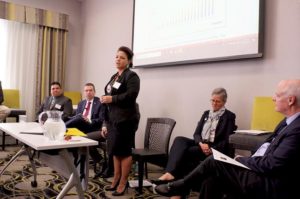Former Fort William First Nation Chief calls for more economic opportunities for Indigenous peoples

By Rick Garrick
THUNDER BAY—Former Fort William Chief Georjann Morriseau called for more economic opportunities for Indigenous people during the Canadian Chamber of Commerce’s Changing the Landscape in Business-Indigenous Community Relationships Roundtable in Thunder Bay.
“People want to see real change,” says Morriseau, director of First Nations Relations and Aboriginal Affairs at Resolute Forest Products and one of the five panelists during the roundtable. “They want to see what are we actually doing to meaningfully engage with Aboriginal people and ensure that they are more than included and that they are part of the economic engine and that there is economic reconciliation truly happening at the table.”
Jason Thompson, owner of Superior Strategies, board member with the Thunder Bay Chamber of Commerce and a Red Rock Indian Band citizen, also participated as a panelist along with Christian Paradis, senior vice-president, Strategic Development, Protective Services Garda; Ginny Flood, vice-president, Government Relations, Suncor; and John Mullally, vice-president, Corporate Affairs and Energy Regulation, Goldcorp.
“There were some really good learnings for the corporate Canada attendees relative to the struggles we face as Aboriginal business, Aboriginal organizations around inclusion and engagement,” Thompson says. “I think they were here looking for answers, looking for suggestions as to how they can improve their engagement of Aboriginal people. And you saw a lot of [nods of acknowledgement], so they were receiving the information, digesting the information and thinking about ways to implement.”
The roundtable featured five key questions of discussion, including what is the nature of your relationships with Indigenous communities and non-Indigenous communities.
“We’re starting to make progress in terms of beginning to close some of the chasms there has been in the past between Indigenous communities and business, but we are just getting started,” says Perrin Beatty, president and CEO of the Canadian Chamber of Commerce. “There is so much more that we can do — there is a real passion to seeing more done. There is a lot of goodwill out there, but it is a long journey ahead of us still.”
Shuniah Mayor Wendy Landry, a Red Rock Indian Band citizen, brought up the lack of diversity among the membership of boards, chambers and municipalities during the roundtable.
“I think we can do our own due diligence in looking around at our boards and looking around at the committees we sit on to make sure that if there isn’t Indigenous representation, then people should take the initiative to go out and mentor somebody to bring them on those boards,” Landry says.
Red Rock Indian Band Chief Matt Dupuis says it was “great to hear some constructive conversation” about changing the dynamics of how business is done in the area.
“A lot of times with First Nations we are dealing with wanting to train and educate our youth for work that is coming up in the area, so one point was don’t come when the government says you have to start consulting, come early and converse,” Dupuis says. “Most First Nations are totally pro-economic development. And you can’t develop economically if you don’t socially.”
Melissa Hardy-Giles, owner of ORIGIN Operator Recruitment and Training, a Red Rock Indian Band citizen and a board member candidate for the Thunder Bay Chamber of Commerce, brought up the issue of partnerships between Indigenous and non-Indigenous companies during the roundtable.
“I wouldn’t mind seeing ORIGIN in some of their results and their quotes of successful partnerships,” Hardy-Giles says. “We like to think of our company as being a bridge to full-time employment.”


